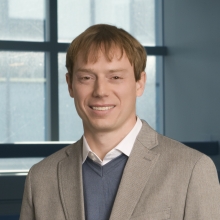Penn Launches New Center for Quantum Information, Engineering, Science and Technology (Penn QUIEST)

Through major investments by governments around the world, and with companies large and small seeking to realize practical quantum technologies, we are witnessing the dawn of the quantum information age. On Jun. 13, Dawn Bonnell, Senior Vice Provost for Research at the University of Pennsylvania, announced with Steven J. Fluharty, Dean of the School of Arts & Sciences and Thomas S. Gates, Jr. Professor of Psychology, Pharmacology, and Neuroscience, and Vijay Kumar, Nemirovsky Family Dean of the School of Engineering and Applied Science, the formation of a new Center for Quantum Information, Engineering, Science, and Technology (Penn QUIEST).
QUIEST is a transdisciplinary field that draws from physics, materials science, and information science. “We are at an inflection point in science and technology akin to the digital revolution of the 1960s or nanotechnology revolution of the 1990s,” says Bonnell. “As with these earlier transformations, we cannot foresee where the technology will go. But Penn has a long and extensive history in leading the way in information science, and with QUIEST we are prepared to capitalize on the inevitable surprises and opportunities that will emerge.”
The new center brings together around 30 faculty from the School of Arts & Sciences and the School of Engineering and Applied Science.
Through a strategic hiring initiative in the School of Engineering and Applied Science, Penn will recruit a group of new faculty members who will further expand research and teaching capabilities in QUIEST, leveraging and amplifying existing strengths. “Quantum technology is not only poised to revolutionize data science,” says Kumar, “it will also advance Penn Engineering’s signature initiatives in Engineering Health and in Energy and Sustainability.”
Penn QUIEST will facilitate interdepartmental and cross-school academic discourse and scholarship, support the initiation of new transdisciplinary research projects, and help to coordinate academic programs in QUIEST. “This center will create a cohesive, collaborative community for students and researchers from across Penn to lead the world in advancing the boundaries of quantum science and technology toward meaningful, positive global impact,” says Fluharty.
Lee C. Bassett, Associate Professor in Electrical and Systems Engineering, will lead Penn QUIEST together with an Executive Committee of faculty from Penn Arts & Sciences and Penn Engineering.





